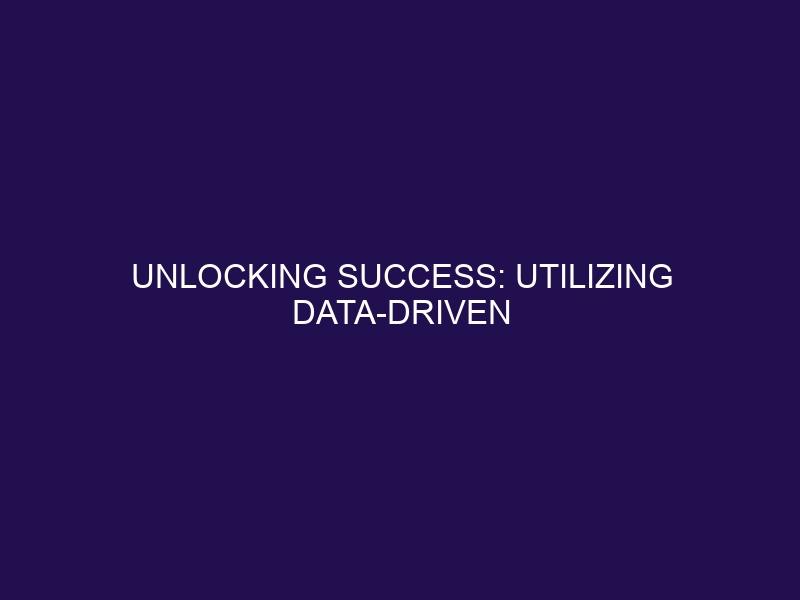Unlocking Success: Utilizing Data-Driven Reporting for Property Managers
Are you a property manager looking to streamline your operations and make data-driven decisions? In the dynamic world of property management, utilizing advanced reporting can be a game-changer. From saving time to identifying growth opportunities and challenges, advanced reporting empowers property managers to make informed decisions that drive success.
In this article, we will explore the concept of advanced reporting, its benefits in property management, and key takeaways for property managers looking to harness the power of data. Let’s dive into how advanced reporting can revolutionize the way property managers approach their day-to-day operations.
Key Takeaways:
Using Advanced Reporting in Property Management
Property management professionals can gain valuable insights and make informed decisions by leveraging advanced reporting tools and data analytics.
Advanced reporting in property management plays a pivotal role in the industry’s landscape, offering a comprehensive understanding of market trends, financial performance, and operational efficiencies. By leveraging the capabilities of data analytics, property managers can identify patterns, forecast future developments, and preemptively address potential challenges.
This strategic approach facilitates proactive decision-making, enabling professionals to optimize property portfolios, enhance tenant experiences, and adapt swiftly to evolving market demands. With accurate and timely insights derived from advanced reporting, property managers can effectively allocate resources, reduce vacancy rates, and ensure tenant satisfaction, all contributing to sustained profitability and competitive advantage.
What is Advanced Reporting?
Advanced reporting in property management involves the utilization of data analytics and statistical analysis to comprehensively analyze market trends and property performance.
Benefits of Advanced Reporting in Property Management
The utilization of advanced reporting in property management offers a multitude of benefits, including real-time insights, predictive analytics, and opportunities for revenue optimization through machine learning algorithms.
Saving Time
One of the key advantages of advanced reporting in property management is its capability to save time through efficient data-driven processes and automated analysis.
By integrating state-of-the-art technology, advanced reporting systems can collate, analyze, and present vital property data in a comprehensive manner. This not only streamlines the reporting process but also enables property managers to make well-informed decisions promptly.
Automation in generating reports and analyzing trends helps in freeing up valuable time for managers, allowing them to focus on crucial task areas such as client relations and strategic planning. The ability to pull relevant information from myriad data sources with precision contributes to the overall efficiency of property management operations.
Identifying Trends
Advanced reporting enables property managers to identify and understand market trends through in-depth analysis of market dynamics and geospatial data.
This involves the utilization of cutting-edge technology to gather and process vast amounts of data, providing insight into consumer behavior, economic indicators, and competitive landscapes. By leveraging these tools, property managers can anticipate market changes, forecast demands, and make data-driven decisions to optimize property performance.
Advanced reporting allows for the identification of emerging opportunities in untapped locations or underserved segments of the market, contributing to overall strategic growth and long-term sustainability.
Identifying Patterns
Property managers can leverage advanced reporting to identify patterns and optimize asset positioning through strategic feature engineering and pattern recognition.
This involves leveraging data analytics and cutting-edge technologies to gain valuable insights into tenant behavior, market trends, and operational efficiencies. By leveraging the capabilities of advanced reporting, property managers can make informed decisions that impact revenue growth and cost savings. It allows them to adapt their strategies based on emerging patterns, ensuring that assets are positioned to meet both current and future market demands.
Identifying Opportunities for Growth
Advanced reporting enables property managers to identify opportunities for growth through strategic business strategies and predictive maintenance insights.
By leveraging advanced reporting tools, property managers gain access to in-depth data analytics that enable them to pinpoint trends, forecast demand, and optimize operational efficiency. This comprehensive approach not only enhances decision-making processes but also helps in understanding tenant preferences and predicting maintenance requirements.
Advanced reporting enables property managers to identify new revenue streams, cost-saving measures, and performance improvement areas, contributing to sustained growth and increased asset value.
Identifying Challenges
Property managers can proactively identify and address challenges through advanced reporting by leveraging data analysis and artificial intelligence capabilities.
By leveraging the capabilities of advanced reporting tools, property managers can gain valuable insights into various aspects of their properties, such as tenant behavior, maintenance requirements, and financial performance. This data, when analyzed using sophisticated algorithms, can reveal patterns and trends that might otherwise go unnoticed, enabling managers to anticipate and mitigate potential issues.
Through the integration of artificial intelligence, these reporting systems can even suggest strategies for improving efficiency and reducing costs, providing a proactive approach towards managing property challenges.
Increasing Profitability
An essential outcome of advanced reporting in property management is the potential for increasing profitability through revenue optimization and energy-efficient practices.
By implementing advanced reporting tools and analytics, property managers can gain deeper insights into their operations, enabling them to identify underperforming assets and inefficiencies in resource utilization. This facilitates well-considered choices, leading to streamlined processes and cost reductions.
With advanced reporting, property management can also enhance tenant satisfaction by addressing maintenance issues proactively, thereby increasing tenant retention and attracting new occupants.
Key Takeaways on Advanced Reporting for Property Managers
In conclusion, property managers can harness the power of advanced reporting to make data-driven decisions, implement smart home technology, and streamline tenant screening processes.
Frequently Asked Questions
What is advanced reporting for property managers?
Advanced reporting for property managers is the process of using data and analytics to inform decision-making in the management of properties. This includes analyzing various metrics such as occupancy rates, rent collection, and expenses to identify trends and make data-driven decisions.
Why is using data important for property managers?
Using data allows property managers to have a deeper understanding of their properties’ performance and make informed decisions about operations and investments. It also helps identify areas for improvement and optimize resources for better results.
What types of data are typically used in advanced reporting for property managers?
Property managers typically use data such as occupancy rates, rent collection, maintenance costs, vacancy rates, and market trends to inform their decision-making. They can also incorporate financial data, such as budget and revenue projections, to gain a holistic view of their properties’ performance.
How can advanced reporting benefit property managers?
Advanced reporting can benefit property managers in various ways, including identifying cost-saving opportunities, improving efficiency and profitability, and making informed decisions about property investments. It can also help streamline operations and improve tenant satisfaction.
Do property managers need any special skills to use advanced reporting?
While some basic knowledge of data analysis and reporting is helpful, property managers do not necessarily need to have specialized skills to use advanced reporting. Many property management software systems have built-in reporting features that make it easy for managers to access and analyze data.
Are there any potential challenges to using advanced reporting for property managers?
One potential challenge of using advanced reporting is ensuring data accuracy and consistency. Property managers must have reliable data sources and systems in place to collect and analyze data accurately. Additionally, interpreting and making decisions based on data can be complex and time-consuming, so it’s important to have a clear understanding of the metrics being used.







